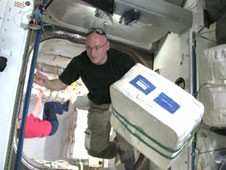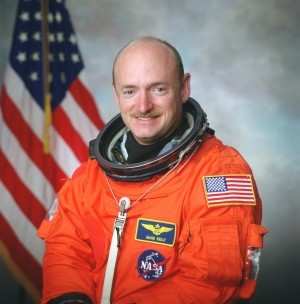Wed, Mar 12, 2014
Study Will Examine Differences Between A Twin In Space And One On Earth
Only one set of twins has ever been into space, and now those twins are providing an unprecedented opportunity for scientists to understand better the effects of microgravity on the human body.

NASA's Human Research Program (HRP) will fund 10 short-term, first-of-its-kind investigations into the molecular, physiological and psychological effects of spaceflight in a continuous effort to reduce the health impacts of human space exploration. The National Space Biomedical Research Institute is partnering with HRP to provide genetic counseling and assisting in the management of the research.
This unique opportunity is made possible by NASA's decision to fly veteran astronaut Scott Kelly aboard the International Space Station for one year, beginning March 2015, while his identical twin brother, retired astronaut Mark Kelly, remains on Earth.
This study will focus in part on the comparison of blood samples collected from Scott and Mark at regular intervals before, during and after the one-year mission. Physiological and psychological testing also will be conducted on the brothers before, during and after the mission.

Scientific and technical experts from academia and government reviewed 40 proposals submitted in response to the research announcement "Human Exploration Research Opportunities - Differential Effects on Homozygous Twin Astronauts Associated with Differences in Exposure to Spaceflight Factors." The 10 selected proposals, which are from 10 institutions in seven states, will receive a combined $1.5 million during a three-year period.
HRP regularly assesses crew health and performance during spaceflight to evaluate associated risks. From these assessments, HRP develops strategies to monitor and mitigate these risks. These studies often have the considerable added benefit of advancing health care for people on Earth.
(Pictured: Scott Kelly in top NASA image, Mark Kelly in lower photo)
More News
From 2023 (YouTube Version): Legacy of a Titan Robert (Bob) Anderson Hoover was a fighter pilot, test pilot, flight instructor, and air show superstar. More so, Bob Hoover was an i>[...]
Get The Latest in Aviation News NOW on Instagram Are you on Instagram yet? It's been around for a few years, quietly picking up traction mostly thanks to everybody's new obsession >[...]
Aero Linx: B-52H Stratofortress The B-52H Stratofortress is a long-range, heavy bomber that can perform a variety of missions. The bomber is capable of flying at high subsonic spee>[...]
Altimeter Setting The barometric pressure reading used to adjust a pressure altimeter for variations in existing atmospheric pressure or to the standard altimeter setting (29.92).>[...]
"Knowing that we play an active part in bettering people's lives is extremely rewarding. My team and I are very thankful for the opportunity to be here and to help in any way we ca>[...]
 Classic Aero-TV: Remembering Bob Hoover
Classic Aero-TV: Remembering Bob Hoover ANN FAQ: Follow Us On Instagram!
ANN FAQ: Follow Us On Instagram! ANN's Daily Aero-Linx (05.15.24)
ANN's Daily Aero-Linx (05.15.24) ANN's Daily Aero-Term (05.15.24):Altimeter Setting
ANN's Daily Aero-Term (05.15.24):Altimeter Setting Aero-News: Quote of the Day (05.16.24)
Aero-News: Quote of the Day (05.16.24)




